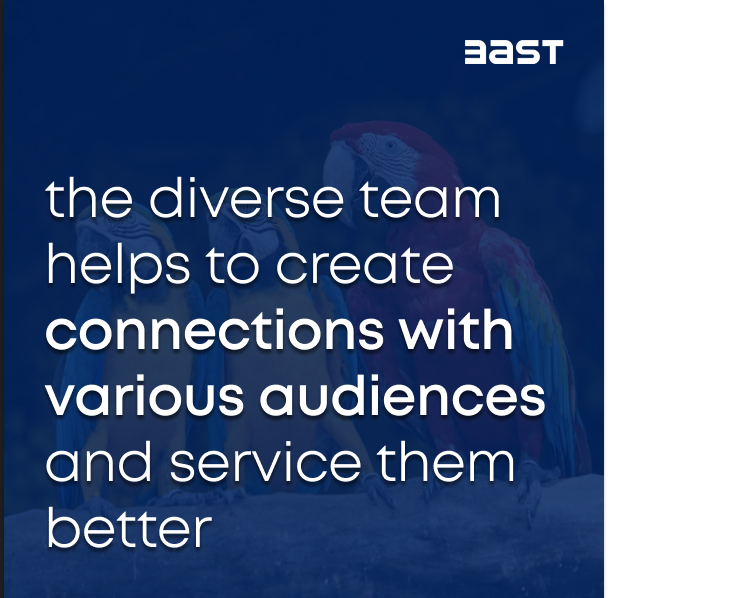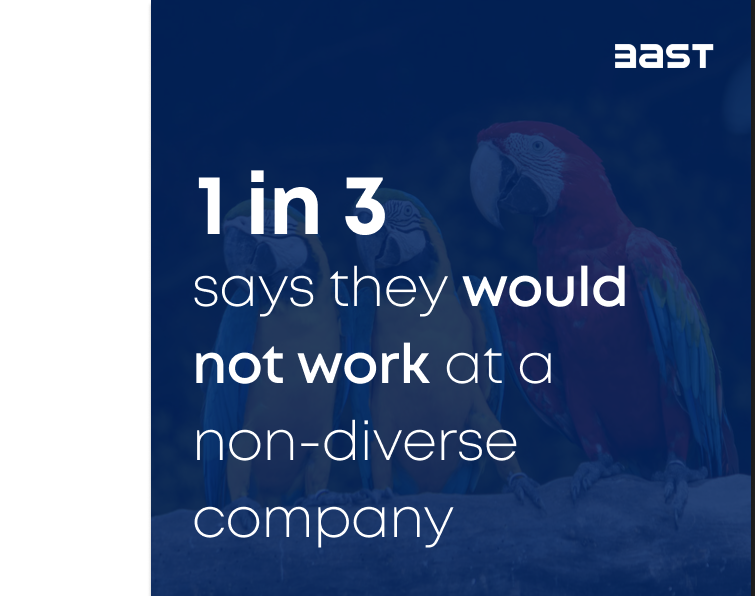Do you agree that salary inflation, compensation based on skills rather than location, and global talent shortage makes searching for tech professionals abroad less favorable?
If you answered yes, you might be surprised by what I am about to tell you. Nearshoring is not only about money. No, seriously. Bear with me.
Even if IT nearshoring prices have increased in the past couple of years due to the high inflation there are far more benefits to talent acquisition in Eastern Europe than just the financial aspect. Nearshoring can give your organization something more valuable that helps it in the long term and will help it to profit in the future. And that something is diversity.
Diversity has been a hot topic in the IT industry for years аnd for a good reason. A team with various social, ethnic, gender, and other backgrounds can have a very positive influence on a company’s:
- profit
- productivity
- creativity
- talent attraction and retention
- personal and professional growth.
These are the five categories in which every modern company aims to excel at. So if you have created an inclusive culture in your organisation, you are on the right track.
A more detailed look will help us understand how diversity helps achieve the above-mentioned benefits.
Let’s start with the one goal that all businesses share.
Increased profit
Various studies show that companies with diverse teams perform better or are more likely to perform better when it comes to financial returns. They increase their market share and are expected to achieve more than less diverse competitors.
There are various reasons for this. If you have global customers, you need a global viewpoint. More useful than focus groups or research is insight from your own team. Talent coming from different backgrounds can offer a valuable perspective which will be helpful when entering new markets or servicing existing ones. They can provide a unique knowledge of culture and law, a network of contacts, and create marketing campaigns that hit the spot.
A more diverse team means a greater chance for the companies in the IT Industry to know about customers’ needs, problems, and desires. Due to this unique knowledge, the diverse team helps to create connections with various audiences and service them better. This means more satisfied customers and increased sales lead volume.
Increased productivity
When all team members come from the same place, they share common know-how. On the contrary, companies that hire professionals from different backgrounds can take advantage of different expertise and experience. And this leads to increased productivity.
These new perspectives also lead to increased capacity for problem-solving, and fresh thinking by creating new links between ideas and also something that few would expect will be beneficial – obstacles. What I mean by this is that a diverse team can initially make communication and work together a bit more complex and this pushes a company to optimize its processes which in the end leads to better performance.
Employees in a diverse environment also feel more motivated and engaged due to the different points of view they bring to the table. This increases their job satisfaction and happier workers are more productive as they tend to be more confident, and more passionate about their work.
Increased creativity
 Bringing together people from diverse cultures and backgrounds is bringing together various experiences, perspectives, beliefs, etc. This means that when your organization opens to the exchange of thoughts and concepts which its members never heard before this ignites creativity. The reason lies in a widely spread theory that says that a new idea is a novel combination of two other ideas. The result is innovation, new solutions, and competitive advantage.
Bringing together people from diverse cultures and backgrounds is bringing together various experiences, perspectives, beliefs, etc. This means that when your organization opens to the exchange of thoughts and concepts which its members never heard before this ignites creativity. The reason lies in a widely spread theory that says that a new idea is a novel combination of two other ideas. The result is innovation, new solutions, and competitive advantage.
A diverse team makes its members feel safe and they are not afraid to voice their innovative concepts because the environment embraces differences. Plus, diversity creates empathy and stronger bonds between team members which also encourages them to share their ideas. This stems from the trust that’s been established between them. This feeling is a strong prerequisite for the thriving of creativity and many psychological studies have explored the relationship between the two.
Increased attractiveness to talent
The new generations are not only avid globe-trotters. They also want to see a change in the world. They are cause-driven and any company in the IT industry that is trying to steer things in the right direction is an attractive employer. This manifests itself in two ways.

The first is applying for a job backed by research. Two in three job candidates say that diversity in the workplace is an important factor in their search. The other one in three says they would not even think of working in a non-diverse company.
Also, keep in mind that it’s not only about choosing a place to work at. After signing their contract these professionals are more loyal, too. They feel valued and can turn into advocates for your employer brand. Moreover, in times in which employee turnover and a lack of talent supply is a massive problem, higher levels of retention are something for which we all should strive.
And what’s best about all this is that it turns into a self-fulfilling prophecy. Creating a culture of diversity attracts diverse talent which cements this culture thus attracting even more diverse talent.
Increased personal growth
How many times have you heard somebody say ‘I am here to learn’ during a job interview?
The strive for professional and personal growth is a defining characteristic of job seekers. And a culture of diversity and inclusivity can assist with this.
Not only will it help team members to learn about cultures, traditions, and living in other countries and social groups, but it will promote empathy and compassion. Seeing life through somebody else’s eyes helps personal growth and reduces negative feelings towards the people they represent.
And this is something that benefits both the individuals in an organization and the business as well. Your employees will become better professionals, more understanding, and will have an increased ability to communicate effectively and productively with colleagues and clients thanks to improved levels of understanding and being able to walk in their shoes.
…and it’s increasingly easier to build a distributed team
There’s another benefit to working with a diverse team gathered through nearshoring. These professionals have much more experience with distributed working models and can assist you in developing your own. It can be difficult to manage team members from different time zones – from a lack of trust to managing distractions, and trying to find the proper balance of autonomy and supervision – that’s why hiring people who are used to the requirements of such conditions will be of great help.
When you build a good distributed team you will be able to enjoy the benefits of this work model as well. Thanks to increased levels of independence employees are more engaged. Also, working from home leads to fewer sick leaves and shorter breaks during the day thanks to the fact employees are happier and feel more fulfillment from the work they do. Their satisfaction increases because they feel less stress and pressure and can keep a better work-life balance. All of these are other factors that lead to greater productivity, loyalty, and employee retention.
Conclusion

Every company in the IT industry that is worth its salt strives to promote productivity, creativity, talent attraction, retention, and the growth of its team. And all these are obtainable thanks to the diversity which the practice of nearshoring brings. Also, the acquisition of IT professionals abroad has financial benefits – it leads to cost-saving and ultimately – profit.
Add to all of the above–mentioned the benefits of building a distributed working model too, and you cannot go wrong.
So keep up with the good practice of nearshoring and building a diverse team and reap the rewards. Which, as we saw, are more than you’ve probably thought.
I’m expert in communication, relationship management and project management with 15 years of experience in the IT industry. I understand the top-level business problem and how it reflects the technical execution of a project.
I currently aid Nordic companies to source talent from Eastern Europe and set up processes to improve the efficiency and success rate of IT offshoring and nearshoring ventures. I’ve gained my experience in Eastern Europe by living in Bulgaria for years and working with Eastern European IT talents over a decade.
Follow me or East on LinkedIn to stay updated about new articles.






